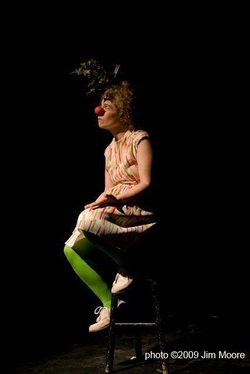Clowning Explained

When they hear the word clown, people generally assume that means kiddie parties or circuses. I don’t work children’s parties and don’t look like a circus clown, though some of my best friends make fabulous balloon animals. Then what sort of clown am I? My background and training being theatrical, the work is character-based, hence the moniker 'theatrical clown'. The idea is not to try to do what might be funny, but respond to the circumstances at hand, just as one would in real life. All this is done while remaining in character. Key is the clown’s pleasure in sharing with an audience a very foolish side of life. Clowning necessitates a willingness to take risks and use failure as a springboard to the next moment. The process is observed through the clown’s struggle to triumph over adversity. She thinks she is in control, but the audience clearly sees she is not. The fun is in the discrepancy. Theatrical clowning emphasizes character and relationships rather than circus skills. Material is created by conceptualization and improvisation, often utilizing one’s own life experiences, though not strictly autobiographical. Therefore, the audience is witness to a personal portrait of human folly. My approach to the character and circumstances is the same preparation as any acting role, drawing on technique, intention, obstacles.
The physical aspect makes use of pratfalls, slapstick, and dance. I refer to clowning as “brilliant stupidity.” Clowns may think they are clever, but the audience observes a silly human, being misled by the folly of her own ego, and confronted by her own limitations. A clown character is "stupid" (another word for silly), but the performer is not. I love to draw on the traditional elements of clowning. However, no one was more surprised than I to find myself using such a cliché of all clown props--the cream pie--in my solo act Tea for One (although I happen to like eating pie a lot.) The ability to welcome public laughter and love being laughed at is a true art that I work to reinforce with each performance. The audience identifies with the clown and loves her for it. It is a collective theatrical experience of the purest form. Though hard work to create effortless "stupidity" on stage, it is a joyous experience to be a complete goofball.
I like to use the word clown as an umbrella term referring to any comic performer (including Stand Up). There are many styles and combinations of those styles. Some are verbal, some are not, and many don't wear red noses. They are on TV, in films and theatres. (They also occur naturally in the environment. I call those types “unintentional clowns.”) Please visit my blog for more on the ins and outs of clowning.
The physical aspect makes use of pratfalls, slapstick, and dance. I refer to clowning as “brilliant stupidity.” Clowns may think they are clever, but the audience observes a silly human, being misled by the folly of her own ego, and confronted by her own limitations. A clown character is "stupid" (another word for silly), but the performer is not. I love to draw on the traditional elements of clowning. However, no one was more surprised than I to find myself using such a cliché of all clown props--the cream pie--in my solo act Tea for One (although I happen to like eating pie a lot.) The ability to welcome public laughter and love being laughed at is a true art that I work to reinforce with each performance. The audience identifies with the clown and loves her for it. It is a collective theatrical experience of the purest form. Though hard work to create effortless "stupidity" on stage, it is a joyous experience to be a complete goofball.
I like to use the word clown as an umbrella term referring to any comic performer (including Stand Up). There are many styles and combinations of those styles. Some are verbal, some are not, and many don't wear red noses. They are on TV, in films and theatres. (They also occur naturally in the environment. I call those types “unintentional clowns.”) Please visit my blog for more on the ins and outs of clowning.
I prefer the clowns who are going: 'I'm an idiot, aren't we all a bit like this?' -Miranda Hart
Man is least himself when he talks in his own person. Give him a mask, and he will tell you the truth. ~Oscar Wilde
Laughter is an instant vacation. ~Milton Berle
Man is least himself when he talks in his own person. Give him a mask, and he will tell you the truth. ~Oscar Wilde
Laughter is an instant vacation. ~Milton Berle
